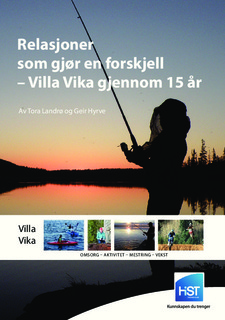Relasjoner som gjør en forskjell – Villa Vika gjennom 15 år
Research report
Permanent lenke
http://hdl.handle.net/11250/148717Utgivelsesdato
2013-04Metadata
Vis full innførselSamlinger
- Institutt for sosialt arbeid [1205]
Sammendrag
The Norwegian child welfare system has undergone substantial changes during the last decades. In this process the use of residential care has been much debated, and political changes have led to a decrease in the use of child care institutions. Meanwhile, it is recognized that institutions are necessary in today's child welfare. However, we know little about the content of various types of child care institutions at present. How do different organizational aspects, practices, and procedures affect the development of children and youth in residential care?
This report presents the findings from an evaluation of the Norwegian child care institution Villa Vika. Children and young people who live and have lived at Villa Vika are interviewed in the study, as well as
parents, employees at the institution, school personnel and representatives from the child welfare system.
It is emphasized that Villa Vika has a home-like and flexible structure, with small units and opportunities to adjust the groups of children and the child-adult connections in each individual case. There is a strong focus on relational aspects, as well as positive activities and experiences that promote development and well-being for the residents. Sufficient time and space for each child is provided by accessible and confident adult figures, contributing substantially to the residents' experience of being seen, heard and recognized in their daily life. Also, the institution promotes extensive cooperation with schools, parents and different recreational actors, which seems to have great significance regarding the residents’ adaptation and development.
The study shows that Villa Vika has a flexible yet robust institutional model, which is based on fundamental humanistic values such as belonging, mastery, independence and generosity. Both the organizational structure and the basic values that are developed by Villa Vika seem to be highly significant in the effort of supporting children and their families.
The evaluation emphasizes the importance of relationships in matters such as children’s rights and participation. But also the relationships between the professional and the children are important to understand the results. The evaluation concludes that one must rethink residential child care and
focused a relational-based practice. It reinforces the idea of supporting children, where the adult can act as guide, ally and a mentor through whom children can acquire increasing knowledge and competencies to take his or her place as a full member of society.
